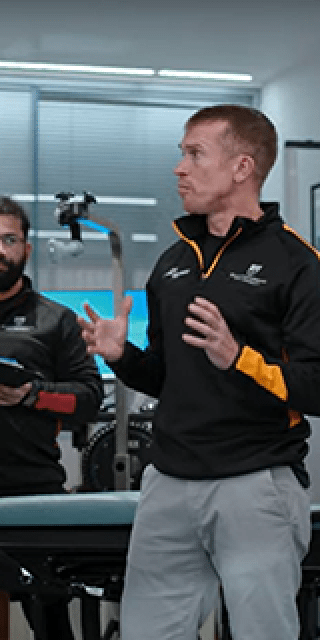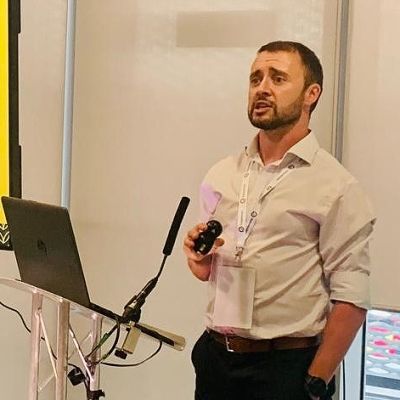
Sports Coaching and Performance Research Group
Sports Coaching and Performance Research Group
Welcome to the Sports Coaching and Performance Research Group at BNU. We are committed to multidisciplinary research in the sports sciences, sports psychology, and coaching, which creates performance and wellbeing benefits for athletes, coaches, and teams at all levels of the competitive sport spectrum.

- Associate Professor
- Senate Representative

- Associate Professor

- Senior Lecturer

- Senior Lecturer

- Pro Vice-Chancellor (Pedagogy and Practice)

- Associate Professor

- Senior Lecturer

- Technician
Selected Current and Recent Projects
Impact of knee taping modalities on muscle activation and jump kinetics
A student-led project, overseen by Rich Collins and Dr Kevin Campbell-Karn, this research has looked to evaluate the roles of various types of patella taping on the recruitment levels of different muscles within the quadricep group, the overall impact on vertical jump performance, and the related kinetic variables associated with jump performance. The project concept has stemmed from the rise of taping use in non-elite athletes and as such has recruited a range of recreational athletes, evaluating changes in performance related metrics for two common types of taping modalities – Kinesiotape and McConnell taping – which are then compared to baseline measures. The inclusion of electromyography assessment also provides valuable insight to the neuromuscular recruitment changes that may facilitate any performance related changes by assessing recruitment of both the Vastus Lateralis and Vastus Medialis quadricep muscles, which would play key roles in potential tracking issues of the patella, a leading cause of anterior knee pain and an issue in which taping is purported to minimise.
‘I’m not the police’: Practical strategies for sport coach mentors to develop trust and trustworthiness
A collaborative project between Dr Ben Clayton at BNU and colleagues at Manchester Metropolitan University, University of Hull, and Northumbria University, the examined the place and importance of trust from the mentor’s perspective and how mentors established trustworthy impressions. Findings suggested a) that the mentors defined trust as a crucial construct in the development of mentee motivation, learning, and engagement, b) establishing trustworthy impressions was important for the mentors’ material and non-material interests, c) mentors reported how mentees were initially aloof due to an apparent distrust of NGBs, and d) mentors used numerous interactional strategies to create trustworthy impressions. These included i) deformalising mentor-mentee relationships, ii) actively demonstrating reliability as mentors, iii) using mutually beneficial lies to simultaneously secure buy-in and build mentee confidence and self-esteem, iv) illustrating their own fallibility as sport coaches, v) considering the value of displaying their own coaching competency, and vi) developing mentees’ competencies through empowerment. The findings offer practical strategies for NGBs and other [non]sporting bodies to support mentors in creating trustworthy impressions and build successful mentoring relationships.
Publications relating to this project:
Ives, B., Clayton, B., Gale, L., Taylor, W., Leeder, T. & Nichol, A. (2023) ‘I’m not the police’: Practical strategies for sport coach mentors to develop trust and trustworthiness, Qualitative Research in Sport, Exercise, and Health https://doi.org/10.1080/2159676X.2023.2271015.
For more information about this project, please contact Dr Ben Clayton (ben.clayton@bnu.ac.uk).
Current PhD / MPhils
‘Breaking and the Olympics: An exploration of the judging system during Breaking’s diversification from subcultural artform to mainstream artistic sport.’
‘The female athlete: A sex-differences approach to training individualisation.’
‘Nutritional intervention designed to improve the dietary intake, sports nutrition knowledge and energy availability of female football players.’
‘Developing team resilience in high-performance sport.’
‘Wellbeing support in the Talent Pathway.’
Past PhD / MPhils
‘The effects of training stimulus on the time course of recovery in central and peripheral fatigue in a group of elite youth male football players.’ (MPhil)
Selected Outputs
Bradley, S., Tufton, L., & Hemmings, B. (2018). Self-disclosure within the sport-psychologist athlete relationship. Sport & Exercise Psychology Review, 15(1), 3-12.
Cerda-Kohler, H., Haichelis, D., Reuquén, P., Miarka, B., Homer, M., Zapata-Gómez, D., & Aedo-Muñoz, E. (2022). Training at moderate altitude improves submaximal but not maximal performance-related parameters in elite rowers. Frontiers in Physiology, 13, 931325.
Decroos, S., Lines, R. L., Morgan, P. B., Fletcher, D., Sarkar, M., Fransen, K., ... & Vande Broek, G. (2017). Development and validation of the Characteristics of Resilience in Sports Teams Inventory. Sport, Exercise, and Performance Psychology, 6(2), 158.
Gallagher, D., King, D., Hume, P., Clark, T., Pearce, A., & Gissane, C. (2021). Annual baseline King-Devick oculomotor function testing Is needed due to scores varying by age. Sports, 9(12), 166.
Lewis, N. A., Simpkin, A. J., Moseley, S., Turner, G., Homer, M., Redgrave, A., ... & Burden, R. (2020). Increased oxidative stress in injured and ill elite international olympic rowers. International journal of sports physiology and performance, 15(5), 625-631.
Lewis, N. A., Redgrave, A., Homer, M., Burden, R., Martinson, W., Moore, B., & Pedlar, C. R. (2018). Alterations in redox homeostasis during recovery from unexplained underperformance syndrome in an elite international rower. International journal of sports physiology and performance, 13(1), 107-111.
Morgan, P. B., Fletcher, D., & Sarkar, M. (2013). Defining and characterizing team resilience in elite sport. Psychology of sport and exercise, 14(4), 549-559.
Morgan, P. B., Fletcher, D., & Sarkar, M. (2015). Understanding team resilience in the world's best athletes: A case study of a rugby union World Cup winning team. Psychology of Sport and exercise, 16, 91-100.
Morgan, P. B., Fletcher, D., & Sarkar, M. (2017). Recent developments in team resilience research in elite sport. Current Opinion in Psychology, 16, 159-164.
Morgan, P. B., Fletcher, D., & Sarkar, M. (2019). Developing team resilience: A season-long study of psychosocial enablers and strategies in a high-level sports team. Psychology of Sport and Exercise, 45, 101543.
Nevin, J. (2019). Autoregulated resistance training: does velocity-based training represent the future? Strength & Conditioning Journal, 41(4), 34-39.
Nevin, J., & Jones, M. I. (2022). Human Performance Optimization (HPO) for the Warfighter—Keeping It Simple in a Complex Age: A Narrative Review. Strength & Conditioning Journal, 10-1519.
Nevin, J., Kouwijzer, I., Stone, B., Quittmann, O. J., Hettinga, F., Abel, T., & Smith, P. M. (2022). The science of handcycling: a narrative review. International journal of sports physiology and performance, 17(3), 335-342.
Nevin, J., & Smith, P. M. (2020). The anthropometric, physiological, and strength-related determinants of handcycling 15-km time-trial performance. International Journal of Sports Physiology and Performance, 16(2), 259-266.
Nevin, J., & Smith, P. M. (2021). The relationship between absolute and relative upper-body strength and handcycling performance capabilities. International Journal of Sports Physiology and Performance, 16(9), 1311-1318.
Nevin, J., & Smith, P. (2021). The effectiveness of a 30-week concurrent strength and endurance training program in preparation for an ultra-endurance handcycling challenge: a case study. International Journal of Sports Physiology and Performance, 16(11), 1712-1718.
Nevin, J., Smith, P., Waldron, M., Patterson, S., Price, M., Hunt, A., & Blagrove, R. (2018). Efficacy of an 8-week concurrent strength and endurance training program on hand cycling performance. The Journal of Strength & Conditioning Research, 32(7), 1861-1868.
Tufton, L. R., & Jowett, S. (2021). The elusive “feel”: exploring the quality of the rider–horse relationship. Anthrozoös, 34(2), 233-250.
Tufton, L. R., Kentzer, N., & Kingsley, B. E. (2023). The Human–Horse Relationship: Human Direct and Meta Perceptions of Its Importance for Performance and Welfare in Equestrian Sport. Anthrozoös, 1-18.
Contact Information
For more information about the Sports Coaching and Performance Research Group or any of its projects, please contact group lead Rich Collins (rich.collins@bnu.ac.uk).